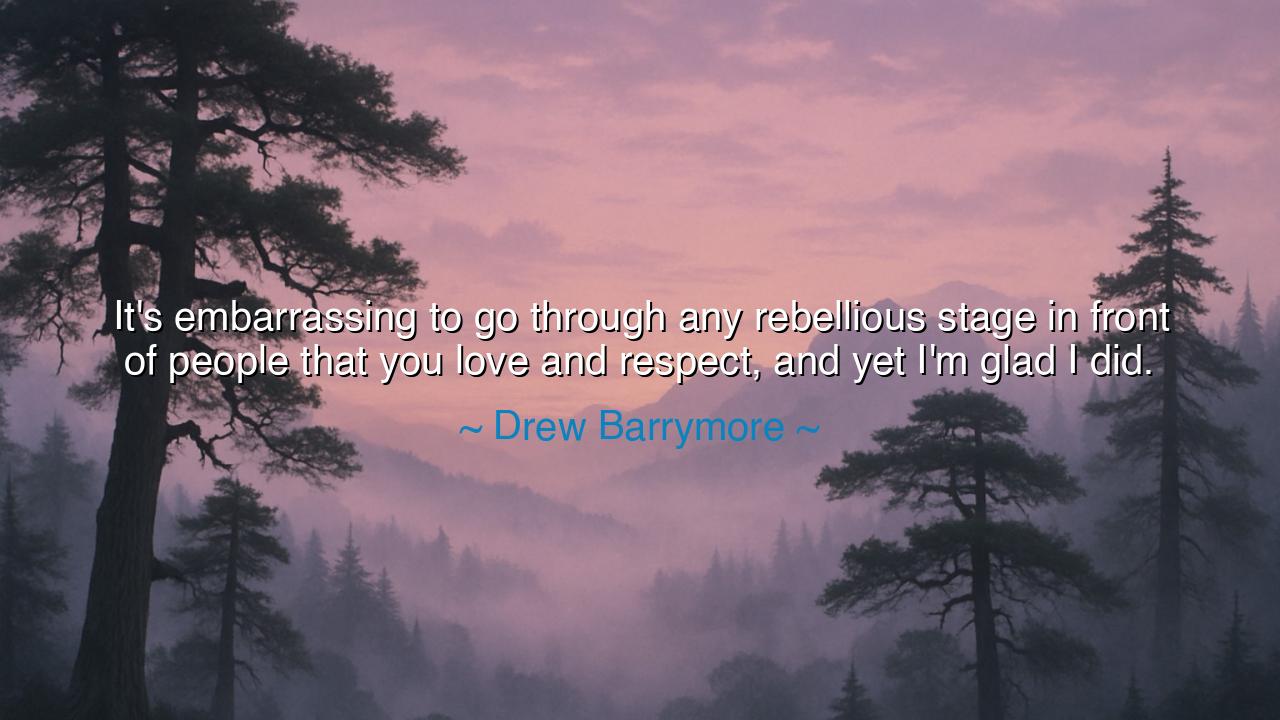
It's embarrassing to go through any rebellious stage in front of
It's embarrassing to go through any rebellious stage in front of people that you love and respect, and yet I'm glad I did.






Hearken, O children of reflection and lovers of truth, to the words of Drew Barrymore, who confessed: “It’s embarrassing to go through any rebellious stage in front of people that you love and respect, and yet I’m glad I did.” Within this confession lies a truth as ancient as the soul itself—the eternal struggle between the growth of the self and the judgment of others. Rebellion, though painful and often misunderstood, is the fire through which the spirit tempers itself. And Barrymore, speaking from a life lived in the public eye, reminds us that even humiliation can become the cradle of wisdom when faced with courage and humility.
Since the earliest days of civilization, every generation has wrestled with the need to define itself anew. The youth rebel not because they despise wisdom, but because they seek to discover their own. The ancients understood this tension well: in every soul lies the need to break from the shadow of elders, to stumble, and to rise again as one’s own being. Barrymore’s words remind us that embarrassment is the tax of authenticity, and that even the painful seasons of rebellion serve a sacred purpose—they reveal who we are beneath the expectations of those we seek to please.
Consider the story of Prince Siddhartha, who would become the Buddha. Though raised in luxury and surrounded by the affection of his father and kin, he turned from the palace walls to confront the suffering of the world. His departure, viewed by many as rebellion, was an act of awakening. Those who loved him did not understand, yet his courage to defy their comfort birthed enlightenment for millions. So too, Barrymore’s reflection speaks to the same principle—that the path to wisdom often passes through defiance, misunderstanding, and personal transformation.
In her words we sense the humility of one who has walked through fire. The embarrassment she speaks of is the mark of awareness—the realization that growth can wound others’ expectations even as it heals our own souls. To live publicly, to falter before those whose opinions we treasure, is among the deepest forms of vulnerability. Yet from this exposure arises strength; for shame, when met with courage, becomes wisdom’s seed. The soul that hides from growth remains static; the one that faces its awkward evolution becomes radiant with understanding.
History reminds us that every great figure passed through their own season of rebellion. Galileo defied the Church to speak the truth of the stars, enduring ridicule and imprisonment. Joan of Arc stood before kings and armies, condemned as insolent, yet her faith transformed nations. Their defiance was not hatred—it was conviction, the insistence that growth sometimes requires disappointing even those we revere. Thus, Barrymore’s confession carries the tone of an ancient teaching: to rebel with conscience is not destruction, but rebirth.
The lesson is luminous: growth often offends before it enlightens. The ones who love us may misunderstand our transformation, yet the duty of the self is to evolve truthfully, even when the path is painful. Embarrassment is but the echo of the past protesting the birth of the new self. As the wise have always taught, one must fall into error and discomfort to rise into authenticity.
Practical action flows from this insight: when you find yourself in conflict with those you love, act with honesty rather than fear. Speak your truth, but temper it with respect. Understand that rebellion is not the rejection of love, but the pursuit of understanding. Apologize where you must, but do not repent for growing. Let your mistakes refine you rather than shame you.
O seeker of understanding, remember this: to rebel is to live, and to be embarrassed is to awaken. Let the words of Drew Barrymore remind you that every stumble before those you love can become a step toward greater wisdom. The fire of growth may scorch the heart, but from its ashes rises a self that is real, humble, and free—a being forged in the sacred balance between love and independence.






AAdministratorAdministrator
Welcome, honored guests. Please leave a comment, we will respond soon